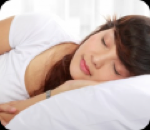
There are Effective Natural Alternatves to Sleep Medications
Sleep is as individualised as it is essential to your health. Whether you generally fall asleep easily or are more of an insomniac, it's good to have a few tried and true sleep aids on hand that are gentle, effective and more importantly, non-habit forming.

Despite the potential side effects, drugs for sleep disorders are among the most prescribed medications, often with patients trying one after another to find the one that works.Unfortunately, many are habit-forming.
There are several natural sleep aids to consider that are safe, soothing, and unlike many insomnia medications won't leave you chemically addicted.
1. Melatonin
A natural hormone that is released by the pineal gland in the brain during evening hours, dropping in production as the morning light increases. Experts suggest you take a melatonin supplement two hours before you want to fall asleep.
2. Vitamin D
Exposure to sunlight is nature's way of maintaining a healthy circadian rhythm, and is the primary source for synthesizing Vitamin D in the skin. There are many genetic processes regulated by Vitamin D, making adequate intake of Vitamin D essential for your body and your sleep.
Even though I take a 1,000 IU tablet of Vitamin D every morning, my recently tested level is at the lower end of that recommended by the Department of Health. The coming sunny days should be beneficial.
3. Valerian
Valerian root is known for being the inspiration behind the anti-anxiety drug Valium.
Valerian leaves and the rhizome have been used in herbal remedies for hundreds of years and are now more commonly used in teas.
4. Chamomile
There is nothing more soothing than a warm cup of chamomile tea, which has become synonymous with sleepiness. A study showed that chamomile drinkers had better sleep scores than the control group.
5. Cannabis (cannabinoids)
No study on sleep patterns would be complete without including this plant, which has a history as a herbal remedy that spans millenia. A 2017 study found that cannabinoids may have therapeutic potential for the treatment of insomnia.

